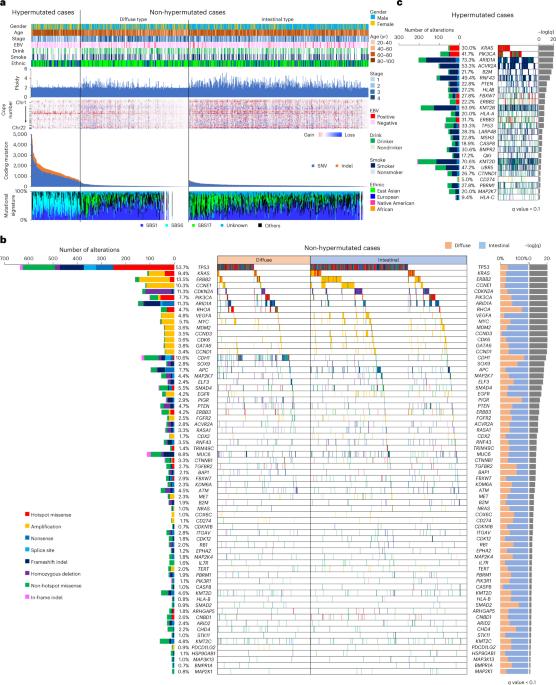Multiancestry genomic and transcriptomic analysis of gastric cancer
IF 29
1区 生物学
Q1 GENETICS & HEREDITY
引用次数: 2
Abstract
Gastric cancer is among the most common malignancies worldwide, characterized by geographical, epidemiological and histological heterogeneity. Here, we report an extensive, multiancestral landscape of driver events in gastric cancer, involving 1,335 cases. Seventy-seven significantly mutated genes (SMGs) were identified, including ARHGAP5 and TRIM49C. We also identified subtype-specific drivers, including PIGR and SOX9, which were enriched in the diffuse subtype of the disease. SMGs also varied according to Epstein–Barr virus infection status and ancestry. Non-protein-truncating CDH1 mutations, which are characterized by in-frame splicing alterations, targeted localized extracellular domains and uniquely occurred in sporadic diffuse-type cases. In patients with gastric cancer with East Asian ancestry, our data suggested a link between alcohol consumption or metabolism and the development of RHOA mutations. Moreover, mutations with potential roles in immune evasion were identified. Overall, these data provide comprehensive insights into the molecular landscape of gastric cancer across various subtypes and ancestries. A cross-ancestry genomic and transcriptomic cohort of gastric cancer highlights significantly mutated genes and mutational signatures, some of which are ancestry-specific.

胃癌的多基因组和转录组分析
胃癌是全球最常见的恶性肿瘤之一,具有地域、流行病学和组织学异质性。在此,我们报告了胃癌驱动基因事件的广泛、多序列图谱,涉及 1,335 个病例。我们发现了 77 个明显突变的基因(SMGs),包括 ARHGAP5 和 TRIM49C。我们还发现了亚型特异性驱动基因,包括PIGR和SOX9,这些基因在弥漫亚型胃癌中富集。SMG也因Epstein-Barr病毒感染状况和血统而异。非蛋白截断型CDH1突变的特点是框架内剪接改变,以局部胞外结构域为目标,独特地出现在散发性弥漫型病例中。在具有东亚血统的胃癌患者中,我们的数据表明饮酒或新陈代谢与RHOA突变的发生有关。此外,我们还发现了在免疫逃避中具有潜在作用的突变。总之,这些数据提供了对不同亚型和不同血统胃癌分子图谱的全面了解。胃癌的跨祖先基因组和转录组队列突显了显著突变的基因和突变特征,其中一些基因和特征具有祖先特异性。
本文章由计算机程序翻译,如有差异,请以英文原文为准。
求助全文
约1分钟内获得全文
求助全文
来源期刊

Nature genetics
生物-遗传学
CiteScore
43.00
自引率
2.60%
发文量
241
审稿时长
3 months
期刊介绍:
Nature Genetics publishes the very highest quality research in genetics. It encompasses genetic and functional genomic studies on human and plant traits and on other model organisms. Current emphasis is on the genetic basis for common and complex diseases and on the functional mechanism, architecture and evolution of gene networks, studied by experimental perturbation.
Integrative genetic topics comprise, but are not limited to:
-Genes in the pathology of human disease
-Molecular analysis of simple and complex genetic traits
-Cancer genetics
-Agricultural genomics
-Developmental genetics
-Regulatory variation in gene expression
-Strategies and technologies for extracting function from genomic data
-Pharmacological genomics
-Genome evolution
 求助内容:
求助内容: 应助结果提醒方式:
应助结果提醒方式:


